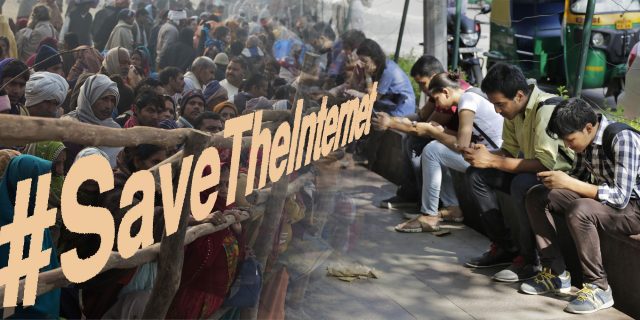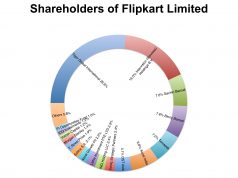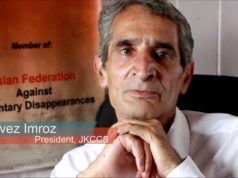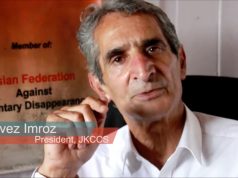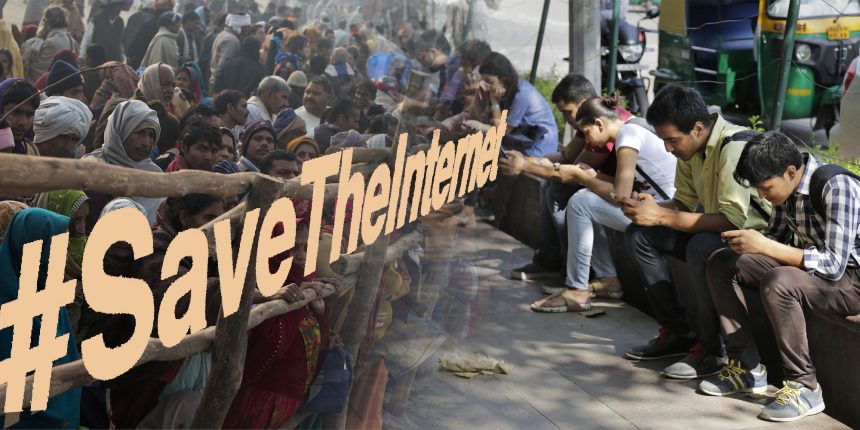
The organizers behind the #SaveTheInternet hashtag and accompanying Web site have launched a campaign urging Internet users to write to the Telecom Regulatory Authority of India (TRAI). #SaveTheInternet has made extra effort to focus opposition against Facebook's Free Basics service. However, the campaign is misguided, based on outdated information, and will harm those without Internet access in India.
The last time that TRAI invited a public consultation on Internet services, in March 2015, over a million Internet users responded. The aim then was to voice support for Net Neutrality (that term has been explained enough and is a quick search away). This time the public consultation focuses more narrowly on differential pricing. Free Basics, conceived and promoted by Facebook, appears to fall into this area. While the TRAI's repeated request for public input has raised questions about its motives, the questions that are not getting much airing are for #SaveTheInternet. The two that come foremost to mind are, "Save the Internet from what?" and "Save it for whom?"
Facebook's Free Basics platform provides mobile consumers free access to Web sites and services if their telecom operator joins the program. So far, in India, only Reliance Communications has signed up, and its mobile consumers can access Web sites that abide by the service's guidelines. Facebook is promoting it and therefore is the public face of the service, but Facebook does not provide the Internet connectivity.
Since the telecom operator grants consumers free data usage, Free Basics limits the type of available services to those that don't use up too much data and to those that don't compete with the telecom operator's voice telephony business. So, for example, Video streaming and Internet-based voice apps are not allowed.
Web sites that seek to be included in Free Basics must conform to certain technical guidelines that would permit Facebook to render a simplified version of the Web page. This is necessary because modern Web pages are loaded with not just text and images, but also code that is executed in the browser and which makes the pages dynamic and interactive. Such pages can be quite sizable, which is a problem for those using 2G networks, and may not work on feature phones. Out of the nearly one billion mobile connections in India, if only 200-300 million are 3G enabled smartphones, then the remaining 700 million are 2G feature phones. Those would be Free Basic's ideal target customers.
Clearly Facebook is not being completely altruistic in providing this service. It probably wants to get more people hooked on its service. And just as clearly Reliance Communications probably wants to get people using the Internet so that one day they will opt for a paid plan. However, in the meantime, people who have never experienced the Web or who cannot afford to, who do not have Rs500 or even Rs100 of discretionary income every month, can get online, albeit in a limited fashion.
"Save the Internet" is an excellent call to action, and people will instinctively click a button to support that idea. However, the campaign's arguments do not hold up, and there is no public debate where they can be rebutted. The number of emails generated on its false premise should hold sway insofar as it indicates public interest, but should not be counted as a vote for #SaveTheInternet's stance.
Here are 11 ways that #SaveTheInternet's objections to Free Basics (in italics), taken from the sample email on its site, are misguided.
- I endorse the idea of providing “all of the Internet, to all of the people, all of the time”, put forth by the World Wide Web Foundation established by Sir Tim Berners Lee and many other organisations which have been striving to expand connectivity to all without compromising network neutrality.
When it comes to compromising Net Neutrality, some proponents would not consider it even if it would save lives. Back in June the government announced a program in association with Vodafone that would let Vodafone subscribers watch videos containing potentially life-saving information at no cost or data usage count. When asked whether this violated Net Neutrality and should be blocked, one of the main movers behind #SaveTheInternet responed, "Don't see a reason for an exception."
Tim Berners Lee's name has been invoked on other occasions by #SaveTheInternet. While his development of the World Wide Web is a tremendous contribution, there is no sign that his ideals have achieved much in expanding Internet usage in India. Furthermore, Berners Lee's opinion is not all that relevant. It is not up to just the inventor of a technology to decide how it should be used once it is out in the world. As a policy matter, we need input from all spheres of thought. When that happens, many people are not sure that strict net neutrality is beneficial, even among those who generally support it. As stated by Pranesh Prakash of the Centre for Internet and Society (CIS), "That's what one gets when one loses sight of why we want #NetNeutrality and blindly make it a goal."
The official position taken by CIS also states: "Net Neutrality violations (including some those forms of zero-rating that violate net neutrality) can also have different kinds benefits." In fact the full CIS position paper itself serves as a forceful rebuttal to #SaveTheInternet and is worth a read.
- Deepinder Goyal, Founder and CEO of Zomato has taken his Delhi based business to 23 countries, tweeting that he “Couldn’t have built Zomato if we had a competitor on something like Airtel Zero”.
#SaveTheInternet likes to quote Zomato's founder Deepinder Goyel, but his assertion is a false argument. Not only is there no way to prove the opposite, but that growth to 23 countries was not organically achieved through expansion on the Web. It came about through venture-capital funded acquisition of existing companies in those countries, meaning it had more to do with business strategy than Internet governance. It's possible that some of those acquired companies benefited from a lack of Net Neutrality. Also, Zomato is not yet a stable, successful company, so it's hard to see how this serves as a poster child for keeping the Internet status quo.
- On Facebook’s FreeBasics, services that compete with telecom operator services are not allowed, and Facebook reserves the right to reject applicants to FreeBasics. Even today, VoIP, Video, file transfers and large images are not allowed on FreeBasics/Internet.org.
Although Facebook is publicizing Free Basics and is providing the technology, it is ultimately Reliance Communications that is providing the free data. Facebook has stated that it does not pay its telecom partners. Therefore, this attack on Facebook shows more than a whiff of disingenuousness at best. It seems odd that #SaveTheInternet is attacking a powerless foreign corporation rather than the Anil Ambani led domestic one. Facebook created the platform for Free Basics, but the real actors are the telecom providers. Free Basics would not exist if none of them signed up.
Yet telecom operators are signing up. As explained above, it makes no sense for a telecom operator to hand over unlimited free data usage that will also negatively affect its other revenues. #SaveTheInternet's argument is akin to going to a soup kitchen and asking them to serve caviar and champagne.
- Please note that Reliance Communications and Facebook are yet to publish a complete list of services that form a part of Free Basics (Internet.org).
Perhaps this comment is based on a reading of an older version of Internet.org, when Facebook had pre-selected services that would be included. Since the current version of Free Basics allows any Web site or service to apply to be part of Free Basics, this is akin to asking for a list of all the sites on the Internet.
- The terms and conditions are determined by Facebook, and it reserves the right to change them as and when it desires.
This argument makes no sense. Practically every Web site on the Internet states that the site owner reserves the right to change its terms and conditions without notice. Even the #SaveTheInternet Web site contains similar wording in its Privacy Policy: "We wrote this Privacy Policy, and will update it as necessary."
- "Further, TSPs can also offer 2G data services which are capped at 10/20 MB a month which would not violate any forms of network neutrality."
This suggestion is offered as an alternative to the Free Basics approach, wherein the telecom service provider (TSP) gives each user a capped amount of data for any usage. According to a Web tool that measures the size of Web pages, this recent Medianama article about Free Basics consumes 108KB of data. A 10MB plan would amount to about 92 such Web pages, which may sound like a lot but is just 3 Web pages per day over 30 days. A low resolution video uses 3MB/minute, so 10 MB would let a person watch 3 minutes of video. At minimum quality a Skype call would last 24 minutes.
#SaveTheInternet's suggestion, which limits how much Internet people can use, doesn't seem an improvement over "some stripped down, wall garden in which content options are determined for them," as #SaveTheInternet describes Free Basics. I challenge any #SaveTheInternet supporter to get on a 10MB plan.
- Orange and Mozilla are experimenting with this sort of model in multiple African African and Middle Eastern markets, where users purchasing a $40 (USD) Klif phone receive unlimited talk, text, and 500 MB a month for 6 months.
#SaveTheInternet has not done its homework. Although the story in the press release contained the figures above, in actuality things are different. In Cameroon, for example, the phone cost $41 (not a big difference in price) but only comes with 300MB/month for 3 months. The 3.5" screen phone runs Firefox OS, which was not a popular platform and the app store had a severely limited selection. Therefore, users do not get the full Internet experience (no Skype or WhatsApp, for example), which goes counter to #SaveTheInternet's goals.
What's even more damning, which Mozilla has now cancelled Firefox OS, so #SaveTheInternet is suggesting a failed idea.
- Another possible way of “equal-rating” content so it is free-of-charge to the user is a model where people watch ads in order to access other sites. Mozilla has been exploring this model in a partnership with Grameenphone (owned by Telenor) in Bangladesh, where users can receive 20MB of unrestricted data per day after watching a short ad in the phone’s marketplace.”
Aside from the press release, there is nothing more about this on Grameenphone's Web site. In June 2014 Mozilla also announced a similar program for India, but to date it hasn't launched. As mentioned above, Mozilla has now abandoned its mobile platform.
- At the very outset it must be remembered that improving access is public priority - and not one only to be left to some global private corporations. Private corporations cannot guarantee the neutrality and impartiality in exercising such a core government function and will only cite interests of access for furthering their own commercial profits.
#SaveTheInternet asserts this, then suggests two private, corporate initiatives (Klif phone by Orange in Africa, Grameenphone by Telenor in Bangladesh) as examples. #SaveTheInternet also fails to understand how public policy and government function. A massive government undertaking to extend Internet access to all Indians must come out of the legislative process, it does nothing to suggest it to the telecom regulator.
- "The key difference here is user choice. This is the same user choice which is absent in Free Basics or any other zero rated service."
The key, here, is indeed choice. People who currently have no access to the Internet and cannot afford it are having their choice taken away by #SaveTheInternet. In a free marketplace of ideas, which #SaveTheInternet claims it wants to promote for the Internet, everyone can bring their own product and see whether it succeeds or fails. There has been nothing stopping Mozzilla or any other organization from offering products or services to enable Indians to access the Internet, yet there have been no serious, large-scale offerings. Free Basics is the only implemented pan-India proposal so far.
- In countries such as Indonesia, research has shown that where free Facebook is made available, consumers end up confusing Facebook as the Internet itself. This impacts access to diversity and plurality of content, especially on a platform which controls what content users get to view in their newsfeed.
One company that is making a vocal and visible show of supporting Net Neutrality is the Times of India, whose sister publications, Indiatimes and The Huffington Post India, just joined Facebook Instant Articles, a platform where their content is embedded in Facebook timelines, giving people one less reason to ever venture out beyond Facebook.
While Times Internet, the parent company of Indiatimes and The Huffington Post, cannot be held accountable for #SaveTheInternet's words, the point is that whether or not people confuse the Internet with Facebook is hardly important. Even #SaveTheInternet in earlier letters confused the Internet with the World Wide Web. What matters is whether people are getting the information, entertainment and services that they want. And that depends on actions of companies like Times Internet, that, while attacking Facebook, make decisions that also make Facebook more entrenched.
If there is some essential or widely popular content or service on the Internet that is not available through Free Basics, people will come to know about it (probably through Facebook), and then they can decide whether it is worth it to them to subscribe to a paid plan. #SaveTheInternet provides no reason to think that that this will not happen.
It sounds like #SaveTheInternet wants to preserve the Internet as it is. However, as it is, a huge portion of the Indian population does not access the Internet, and since Internet penetration seems predicated on smartphone ownership, even the optimistic estimate of 650 million smartphones by 2019 means that half the population will not have Internet access. Keeping the status quo is only good for those who have access.
Update: Since this article was written, the Time of India has published an article alleging that TRAI has asked Reliance Communications to stop making Free Basics available while it considers the matter.
Please like NewsPie's page on Facebook so that you get all our articles and others may find us.

